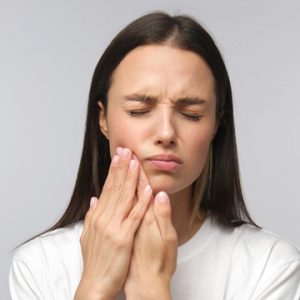
 San Francisco, Marin, and Oakland, CA
San Francisco, Marin, and Oakland, CA
The temporomandibular joint is on either side of your mouth and connects the lower jaw to the skull. When either temporomandibular joint starts to malfunction, whatever the reason, then it leads to a condition called temporomandibular joint disorder. Also known as TMJ disorder or TMD, this condition is estimated to affect more than 10 million Americans, according to the National Institute of Health. In this article, your San Francisco neuromuscular dentists at Glen Park Dental will explore TMJ disorder, how we can help, and whether or not this ailment can be cured.
Get the facts on TMJ disorder
When you have TMJ disorder, something happens to impede the ability of your temporomandibular joints to function as they should. This often affects the jaws—either limiting their range of motion, leading to popping or clicking sounds as they open and close, or pain emanating from the jaws. When TMJ disorder develops, the effects of the condition can radiate quickly throughout the body. The surrounding musculature and nerves are aggravated, sometimes causing more pain.
The compression of these muscles and nerves can spread, causing pain in the face, neck, shoulders, and even the back. TMJ disorder also can cause headaches that occur regularly and are sometimes mistaken for migraines.
While pain is a commonly reported symptom of TMJ sufferers, the consequences of the disorder can vary widely and may include any of the following:
- Stuffiness or ringing in the ears
- Dizziness
- Bruxism – grinding or clenching your teeth, which could occur either when awake or asleep
- Teeth that appear loose or excessively worn
- Tingling or numbness in the extremities
- Tooth pain that appears to migrate to different locations in the mouth at random
- Difficulty chewing
- Heightened tooth sensitivity
Any combination of these symptoms can be signs that you have TMJ disorder, and you should be evaluated by an experienced neuromuscular dentist in San Francisco.
The Importance of Neuromuscular Dentistry
When you see a neuromuscular dentist, you’re seeing an experienced and highly-educated specialist who has dedicated countless hours learning about this specialty of dental science, which focuses on finding the ideal alignment of the bite and jaw. We have two neuromuscular dentists on staff: Dr. Carlos Longa and Dr. Kimberlee Dickerson. Both pursued post-graduate education in neuromuscular dentistry, among other disciplines, at the highly-prestigious Las Vegas Institute for Advanced Dental Studies, and Dr. Dickerson has the distinction of an LVI Fellow. The specialized training of a neuromuscular dentist makes them the ideal medical professional to diagnose and treat TMJ disorder.
How Neuromuscular Dentists Treat TMJ Disorder
Relieving the dysfunction affecting your temporomandibular joint starts by identifying the ideal neuromuscular position of the jaws. Finding this alignment helps prevent the muscular imbalances that can occur during TMJ disorder, causing stability issues with the teeth, bones, or posture. Our neuromuscular dentists in Oakland also will measure the position of the head and neck muscles when relaxed and, from there, determine the ideal physiological alignment of the jaws. From there, treatment will proceed to relieve whatever is making the temporomandibular joint malfunction while also addressing any other issues that have developed due to the disorder, including pain relief.
So, is TMJ disorder curable?
Merriam-Webster Dictionary defines a cure as “recovery or relief from a disease.” Unfortunately, curing TMJ disorder can be tricky, depending on the cause. However, TMJ can easily be managed through treatment overseen by a qualified medical professional, preferably a neuromuscular dentist. The most important thing is to seek treatment. The reason why the number of Americans who have TMJ disorder is estimated is that many people with this condition never receive a proper diagnosis.
TMJ Treatment in San Francisco
You don’t have to live with the pain and other issues caused by your case of TMJ disorder. Glen Park Dental’s neuromuscular dentists can help. Schedule a consultation today by calling (415) 585-1500 if you’re in the areas of Marin, Oakland, and San Francisco, California.


